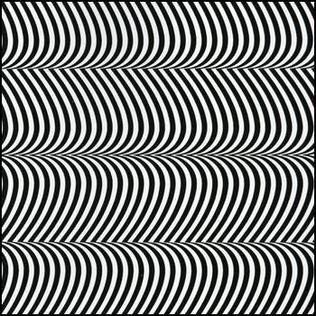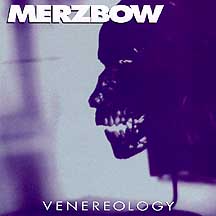Merzbox is a box set compilation by the Japanese noise musician Merzbow. It consists of 50 CDs spanning Merzbow's career from 1979 to 1997. 30 discs are taken from long out of print releases, while 20 are composed mainly of unreleased material. The box also contains two CD-ROMs, six CD-sized round cards, six round stickers, a poster, a black long-sleeve T-shirt, a medallion, and the Merzbook, all packaged together in a "fetish" black rubber box. It is limited to 1000 numbered copies. A Merzbox Sampler was released in 1997.

Pulse Demon is an album by the Japanese noise musician Merzbow, released 28 May 1996. The album was reissued on vinyl in May 2018 by Bludhoney Records, and again in November 2019 by Relapse, with a bonus track.

Venereology is an album by the Japanese noise musician Merzbow. It was inspired by death metal and grindcore.

Scissors for Cutting Merzbow is an album by the Merzbow side project SCUM. It was the last LP record released by ZSF Produkt. The project's name is a play on the SCUM Manifesto, and the track titles were influenced by American post-war art. The artwork are collages including images from Human Sex Anatomy by Robert Latou Dickinson. An expanded version was later included in the Merzbox. Some of the original studio sessions were included on Duo.

Merzbow is a Japanese noise project started in 1979 by Masami Akita. Merzbow is best known for a style of harsh, confrontational noise. Since 1980, Akita has released over 400 recordings and has collaborated with various artists.

Dolphin Sonar is an album by the Japanese noise musician Merzbow. The album is a protest against the annual slaughter of dolphins in Taiji, Japan. Masami Akita is a supporter of Sea Shepherd and Dolphin Sonar includes liner notes by founder Paul Watson.

Antimonument is an album by the Japanese noise musician Merzbow. It was originally released as a picture disc LP and reissued on CD by Art Directe in 1991. The CD is now considered a bootleg since the label did not pay the artists.

Storage is an album by the Japanese noise musician Merzbow. Due to issues with sound quality, the original recording was edited for this release. The original full-length recording was issued in the Merzbox in 2000. The working title for the album was War Storage, which was later used for the track titles of the Merzbox version. The full-length version was reissued as a three-sided double LP in December 2016 by Menstrualrecordings.

Uzu Me Ku is an album by the Japanese noise musician Merzbow. It features the Koto, a traditional Japanese instrument, "manipulated through granular synthesis by digital and analogue electronics devices." According to Masami Akita, "Uzume Hikoyuzu" means "spiral generating" and "Itsu Akitsu" means "generating of particles". The album photos were taken at the Nagasawa Purification Plant in Kawasaki, Japan, which was designed by Mamoru Yamada.

Gman//HJYUGTF2 is an album by the Japanese noise musician Merzbow. According to the label, it mixes noise and drone with clean drumming and Jew's harp. It is from the same sessions as Uzu Me Ku, and the cover photo was taken at the same location.

Ko To No O To is a 7" release by the Japanese noise musician Merzbow. It is the first in a series of 7"s by seven different artists on the label.

Merzbuddha Variations is an album by the Japanese noise musician Merzbow. It features outtakes from the Merzbuddha sessions.

Kibako is a studio album by the Japanese noise musician Merzbow. It was released on December 12, 2012 by the Italian label Rustblade, and is his second release on the label. Rustblade describes the album as consisting of "tribal wooden instruments, violent analogue synths and ambient soundscapes".

Samidara is an album by the Japanese noise musician Merzbow, released as both an LP and a cassette. It was made available for pre-order on December 5, 2012, but didn't start shipping until July 2013.

Collection 009 is an album by the Japanese noise musician Merzbow. It is the ninth volume of the Collection series. The first five volumes were recorded for Ylem and consist of studio sessions with Kiyoshi Mizutani, then a member of Merzbow. However, Ylem went out of business before they could be released. Masami Akita then released them himself and recorded five more at home using previous Collection session recordings mixed with new material and effects.

Grand Owl Habitat is an album by the Japanese noise musician Merzbow. The title track had been released on Takahe Collage.

Pulse Vegan is a 7" release by the Japanese noise musician Merzbow. It is available exclusively to backers of a Kickstarter campaign to fund a vegan food trailer in Austin, Texas being opened by the owner of Elevator Bath. The business is named Pulse Vegan after the recording.

Nezumimochi is an album by the Japanese noise musician Merzbow. It is a picture disc LP and a CD set. It is described as "monotonic electro pulse-noise works by all analogue equipments."

Keio Line is a collaborative studio album by the French electronic rock guitarist Richard Pinhas and the Japanese noise musician Merzbow. The album was released in September 2008, on double CD by Cuneiform Records in the US and on triple LP by Dirter Promotions in the UK. It is the first of several collaborations between Pinhas and Merzbow.

Hatobana is a studio album by the Japanese noise musician Merzbow. It was released on October 14, 2016, by the Italian label Rustblade, and is his fifth release for the label. It was released as a double album and a deluxe edition with a bonus CD. It was originally announced for release on Noisoke Records in 2013.



















